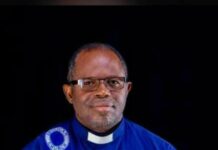This is not the first time that this blog has put a tiny piece of global Anglicanism under the microscope in order to learn what is going on in the wider Church.
On the 21st September 2023, the Diocese of Exeter, published the glossy “Statement of Needs” for its next bishop, and in doing so broke a small corner of the internet.
Despite the mega-byte crunching file-size, it is, in the main, the bland, managerial stuff that is found in such Church of England documents. There is nothing about looking for an episcopal leader with a proven track-record of numerically growing churches, or a proven inspirational preacher and evangelist, or a theologian with a deep understanding of historic orthodox Anglicanism. Instead, there is plenty of being, “…able to think strategically and creatively about…” and “…energetic in encouragement bold in advocacy and gentle in consolation”, as if some dioceses long for a headless, heartless, visionless, voiceless bishop.
The document has a specific section entitled, “Living and Love and Faith”.

Apparently, “The Diocese of Exeter has particularly engaged with the [Living in Love and Faith] process”.
The Statement of Needs goes on to say, “In February 2023 the General Synod gave its backing to the paper from the Bishops that… among other things proposed… prayers that ‘might be used for two people of the same sex who have marked a significant stage in the development of their relationship”.
In what might be seen as a gift of divine providence to a blogger, the document describes the innovation as, “the Payers of Love and Faith”.
So, looking at this microcosm, who pays the price in the Diocese of Exeter of what Synod purportedly “backed” in February 2023?
Four passages, which comprise almost the entirety of the section, are worthy of close consideration.
First, in what appears to a quotation (although without a source and with only opening speech marks) the Statement says:
“‘What the LLF process has revealed is that the established position of the Church of England on same-sex relationships is no longer sustained and supported by a significant number of Anglicans in this country, while at the same time, many Anglicans are still supportive of the established position (’).”
Though more could be said, here are three aspects of this section worth noting:
- Traditionally, the Church of England does not hold ‘positions’ on matters of faith and praxis; instead, there is doctrine, teaching about that doctrine, and liturgical and pastoral practice, that should correspond to that doctrine. The use of the word ‘position’ would appear to be intentionally vague – allowing the reader to make their own assumption about what is meant – while at the same time portraying the LLF process as an adversarial contest between politically constructed ‘positions.’
- In addition, the LLF process has not provided any quantitative analysis that justifies describing some as a “significant number” and others as “many”. Readers will also note the use of the (otherwise entirely otiose) pejorative “still”.
- It is surely presumptuous for a single diocese to declare the position across the “country” as it does. What is more, it might be thought in the process of identifying the next Diocesan bishop there would be more interest in the views of the Anglicans of Devon than those further afield. But then, the diocese is largely rural and traditional – the votes cast in February by the elected members of General Synod from Exeter were more conservative than the national voting patterns – so perhaps such local views are actually not as desireable.
Second, therefore, is this passage, where there is more than a hint of the true preponderance of Devonian feeling:
“Whilst many in the Diocese of Exeter have welcomed the decision at Synod, there are some for whom the proposals have not gone far enough and others for whom they have gone way too far. Some Clergy and PCCs in this latter group have, as a consequence, written to the Bishops expressing their concern, and some have made the decision to withhold or pause their contributions to the Common Fund”.
- Again, the astute reader will notice the, entirely unevidenced, “many” who “welcome” change, the “some” who are even more revisionist and the mere “others” who dissent.
- Such a reader will also have realised that those who agree “welcome” a “decision” but those who don’t dispute mere “proposals”: those who are in agreement affirm something concrete, those who are not are simply leaving matters up for debate.
Third, by framing the narrative in this way, it leads to the assertion that:
“Our challenge is to find a way forward in the midst of these very deep differences, and we anticipate that the Pastoral Guidance that will accompany the Prayers of Love and Faith, and the pastoral reassurance offered will enable us to implement the Synod’s decision and keep walking together.”
The assumptions here are obvious, but are perhaps still worth spelling out:
- It is a given that, despite the “deep differences” over same sex blessings, all in Exeter will “walk together” because those differences are, for all involved, adiaphora, matters that can be papered over with a little pastoral sensitivity.
- It is assumed that the “pastoral guidance” and “pastoral reassurance”, whatever it is, and whether a word of it has even yet been written, will, without question, do nothing to displace the “implementation” of the “decision” (not now “proposals”) “made” in February.
- It will come as a surprise that the Diocese of Exeter are so certain about what will happen in the coming months, particularly to those who believe that the conclusion of the LLF process remained “up for grabs” during the College and House of Bishops’ meetings this week. Perhaps, the soon-to-be Acting Bishop of Exeter, Jackie Searle, has inside information based on Co-Chairing the Pastoral Reassurance Working Group? But, whatever the source of their confidence, so convinced are they of the outcome of the LLF process, they are basing their choice of next bishop on it.
And so, the fourth passage completes the picture of who, in the light of all this the next Bishop of Exeter must be. He or she,
“…will recognise and honour the decisions made in General Synod and who will acknowledge and work with the diversity of voices in the Diocese. We need a Bishop who will be an example of how to live with ‘unity in diversity’…”.
That is to say that anyone now applying to be +Exeter must;
- believe that whatever the truth, Synod has already made a “decision” to introduce the Prayers of Love and Faith, including blessing couples in same-sex marriages.
- accept that regardless of the content of the Pastoral Guidance and pastoral reassurance, the “decision” must, or at the very least such a decision should, be immediately “implemented” in the Diocese.
- in any event not even just tolerate but embody in themselves plural truth on matters that are not adiaphora.
All this is why it doesn’t really matter what happens at Synod in November – all this is already taken as a given if someone is to be appointed as one of the Diocesan Bishops of the Church of England. And surely what is assumed to be for the good on vital matters in a bishop must be assumed to be for the good in all his or her clergy and laity.
Who will foot the bill as, “the payers of Love and Faith”? May the reader decide.



